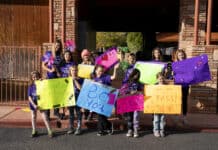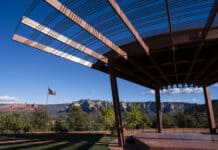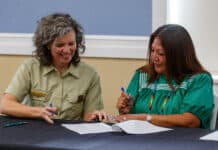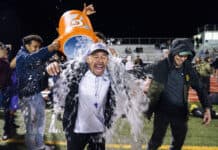Last week, I was competing at the 27th annual National Poetry Slam, a weeklong tournament held this year in Decatur, Ga.
 Poetry topics ranged from social justice, identity, gender equality and politics to death, sexual assault, domestic violence, suicide survival and mental illness to love and sex, some funny, some deadly serious and most emotionally moving.
Poetry topics ranged from social justice, identity, gender equality and politics to death, sexual assault, domestic violence, suicide survival and mental illness to love and sex, some funny, some deadly serious and most emotionally moving.
While we competed under the FlagSlam Poetry Slam banner officially representing Flagstaff, three of our team’s four poets are Sedona residents, and we displayed our city of Sedona flag from the window of our room in the host hotel. Flagstaff and Sedona are sister poetry slam communities and poets often compete in both scenes.
| What is Poetry Slam? |
|
Founded in Chicago in 1984 by construction worker Marc Smith [“So what!”], poetry slam is a competitive artistic sport. The rules are: Poems must be the poet’s own original work.
Advertisement
Poets get a 10-second grace period after 3 minutes. After 3:10, poems are penalized 0.5 points for every 10 seconds over time, so a poem that goes 3:09 loses no points while a poem that goes 3:35 loses 1.5 points. Five members of the audience are selected at random at the beginning of the slam to be judges, rating poems on a scale from 0.0 to 10.0. Judges are told to assign numerical value to individual poems based half on content and half on performance. The high score and low score are dropped and the middle three are added for a possible perfect score of a 30.0. |
Each of the 72 slam teams represents the poetic voice of its home community, chosen via local slams held throughout the year, just as we do here. Poetry slam bouts are judged by five randomly chosen members of the audience.
A three-time NPS competitor, Sedona poet Evan Dissinger’s metaphors weave observations and reflections into profound lyrical visuals.
Claire Pearson is a 2013 graduate of Sedona Red Rock High School, and a multiple national competitor. Sedona residents likely have seen her perform at slams and arts events around the city.
Kim “Possible” Jarchow was our 19-year-old rookie, on her first nationals team. A Northern Arizona University student from Las Vegas, she was bright-eyed throughout NPS, attending side events and eagerly watching the performers with an infectious enthusiasm that reminded veterans like me why we love poetry slam.
“Slam is just a big family of poets that share personal experiences through the spoken word,” Jarchow said. “I love that I have the opportunities to be a part of such a large network of caring, diverse individuals.”
Our first bout on Aug. 2 was tough. We faced Java Monkey, the Decatur home venue; SlamCharlotte, a two-time NPS championship team; and Battle Born, our friends from Las Vegas. We were briefly in second place, but we fell to a close fourth by the end.
 Our second bout on Aug. 4 was against Loser Slam from Red Bank, N.J., Rock Slam from Suffern, N.Y., and Mental Graffiti from Chicago.
Our second bout on Aug. 4 was against Loser Slam from Red Bank, N.J., Rock Slam from Suffern, N.Y., and Mental Graffiti from Chicago.
| National Poetry Slam |
|
The first National Poetry Slam was founded in 1990. Local slams pick four or five poets through a slam or series of slams to represent their venue and city at NPS. At NPS, 72 teams compete in two bouts on different nights against three other teams in a 4×4 rotation. After three days, the top 20 teams go to semi-finals with the winner of each semi-final going to finals on the last night. The FlagSlam Poetry Slam, Sedona’s sister slam, has sent a team to NPS every year since 2001. Teams have represented Flagstaff and Northern Arizona in Seattle (2001), Minneapolis (2002), Chicago (2003), St. Louis (2004), Albuquerque, N.M. (2005), Austin, Texas (2006 and 2007), Madison, Wisc. (2008), West Palm Beach, Fla. (2009), St. Paul, Minn. (2010), Boston and Cambridge, Mass. (2011 and 2013), Charlotte, N.C. (2012), Oakland, Calif. (2014 and 2015), and Decatur, Ga. (2016). Sedona sent its five-poet first team to the 2012 NPS in Charlotte, N.C., its second to the 2013 NPS in Boston and Cambridge, Mass., and its third and fourth to Oakland, Calif., and the fifth to Decatur, Ga. Poetry slam has become an international artistic sport, with more than 100 major poetry slams in the United States, Canada, Australia and Western Europe. |
In the first round, Pearson and Jarchow performed a duo poem that was a merger of their individual pieces about growing up and working in tourist towns, Sedona and Las Vegas, respectively.
Dissinger performed a lyrically rich poem about the rain in round two, just as the semi-outdoor coffee shop was hit by a rain shower, accenting his work and launching us into second place. Jarchow took the stage in round three with an intense confessional poem.
In the final round, we performed a four-person group performance of my ridiculous solo “Peach” comedy poem we had rewritten and memorized the night before. It was a smash, pushing us into a comfortable second place behind Mental Graffiti, captained by my friend Billy Tuggle.
Among the side events, we read at or competed in the Rookie Showcase, the Grief & Remembrance Open Mic, Head 2 Head Haiku Slam, the Nerd Slam — my favorite as I own and brought my custom-built lightsaber — the Slam Family Feud, which is as silly as it sounds, Group Piece Finals and the National Underground Poetry Individual Competition, a poets-only head-to-head competition with a $2,000 cash prize.
NPS has spawned two individual tournaments: The Women of the World Poetry Slam and the Individual World Poetry Slam, all three which head to new host cities every year. This October, iWPS is coming to Flagstaff, organized by outgoing Flagstaff Slammaster John Quinonez, and the Sedona poetry community is involved in helping Flagstaff run the event.
“Something I always look forward to, and am super excited to have come to Northern Arizona is the beautiful body of diverse experiences and voices that the NPS scene encourages,” Quinonez said. “Of course there is the tournament, but more importantly we get an eclectic amount of programming highlighting the diversity of our extended camaraderie.
“Making the time and place to experience these stories, learn from each other, and be in that familiar space sharing and having fun is what really makes slam an extended family.”
Sedona will be selecting our iWPS representative via a poetry slam at the Mary D. Fisher Theatre on Saturday, Aug. 20. Poets from Sedona and around Arizona will compete to represent our city, so I invite all our readers to attend. Click here for information. You will definitely enjoy the night and you might even be a judge.
Christopher Fox Graham
Managing Editor



















